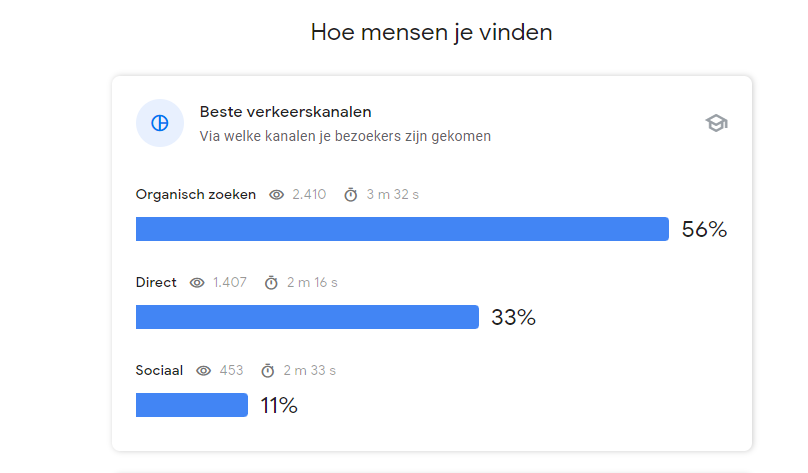Who visits my website?
After you have created your website and hosted it with a web hoster like MijnHostingPartner.com, you should ask yourself who is visiting your website and how they are interacting with it. In this blog post, we'll show you some ways to track this. And how you can benefit from it.
Tracking website visitors is crucial for many websites, because by tracking your website visitors, you can gain better insight into where your audience is. And how you can use this to create more targeted ads in the future or adjust your content on your website accordingly. For example, by making more of a popular product, expanding your services, or simply writing another article that gets read the most. So, it can be interesting for anyone to track and understand the visitors to a website. Regardless of whether you are running a business or just blogging for fun.
Tracking website visitors
To track your website visitors, you can use different techniques. The most common is Google Analytics, which is easy to install on your website. However, there are other options such as Microsoft Clarity, Matomo, which can be installed locally, and others. Many of these tools are hosted externally, which means a piece of javascript code is added to your website that passes all the information to the party. So Google or Microsoft.
So this data no longer stays between you and the visitor, but is also often sent to data centers around the world. So, you can think about it for a moment and decide what you are most comfortable with for your visitors. In any case, you should expand your privacy and cookie policy accordingly. We strongly recommend using the default settings in these tools and not collecting IP addresses. Otherwise, this data will remain anonymous.
Even if you store data locally using a tool like Matomo and Koko Analytics, it is important to state this in the relevant documents on your website. And additionally, install an SSL certificate on your website. This way, all data will always be transmitted over the wire in encrypted form. After you activate your chosen method on your website, it will immediately collect statistics; we then recommend excluding your own IP addresses. This way you do not contaminate the results with your own visits to the website.
From which source your website visitors come
It's important to know what source your website visitors are coming from: Are they coming from direct traffic? Organic or social? And what else does that mean? We'll go into this in more detail below.
Direct traffic is all traffic that arrives directly at your website, meaning anyone who types the URL into their browser and lands on your website. All traffic that can't be accurately labeled is also included under direct traffic. For example, it may come from another website or link. Or from a radio or television ad, for example.
In practice, direct traffic often accounts for only a small portion of your site's total visitors. That's because few users enter your URL directly when you don't yet have name recognition. And even then, this is often entered into Google first. So again, this portion falls under organic or paid traffic.
Organic traffic is traffic that comes from organic sources, which usually means search engines. And comes from Google, Bing, DuckDuckGo or Brave Search, for example. Users then enter a search query, which is translated into a results page with the best matches for the query. By optimizing and investing time and money, you can ensure that your website is as high up in these rankings as possible. All of the traffic that then comes to your website through these search results is then an organic result.
This often accounts for a large portion of your total website visitors, especially since Google is used by much of the Western world for virtually every Internet experience.
Social traffic is visits from the various social networks such as Facebook, Instagram, Reddit and others. These are often videos, posts, and other things you publish to draw attention to your content. This is often short-lived, so it often makes sense to post more frequently on social media than on other channels.
Paid traffic can happen on other websites, the search engines, as well as on social media. These are the ads that you pay for and often work per click or a certain number of impressions of the ads. Paid traffic is the fastest and often the safest way to get traffic to your website. It is therefore used by every company or business.
Reference traffic is traffic that comes from other websites and links and often falls under direct traffic as well. This can be the case, for example, when another website quotes you or links to your content or products. In most cases, you will have to pay for this. Free or organic backlinks are hard to come by in most markets.

What pages are being visited?
Now that you know who visited your site and from where, it's also important to know which pages were visited. This is easy to see with the latest Google Analytics 4 release in the "Pages and Screens" report. Here you can immediately see which pages were visited in the time period you specified. It is also possible to track the history of an individual user and see, for example, on which page they entered and which pages they visited next.
Expand your most popular pages
It is advisable to revisit the most popular pages to see what the reason is. For example, did you advertise them more? Have you put more effort into the content of these pages or linked to them more often from other sites? These things can be put together briefly and applied to new pages or other pages as well. This way you can better distribute the success of your most popular pages. If all your traffic depends on one page or post, this is often a strategy that can backfire. In this case, it's better to spread out the success.
Attract more visitors to your website
Attracting more visitors to a website is naturally on the agenda of several webmasters who want to focus on it in 2023. More visitors mean more eyeballs on your services or products, which in most cases means more sales or purchases. Therefore, it is the goal of almost all website owners to attract more visitors. You can do this in different ways, and can also look for different ways of receiving traffic to your website. So through organic results and paid traffic as two examples.
However, for this you need to check what is possible within your budget and where you can best invest your time. We recommend always keeping up to date with the latest developments. Like now the ChatGPT A.I. is shaking up the world with its answers and proposals. Therefore, it is important to anticipate some developments on the Internet and take advantage of them.
Want to learn more about websites, hosting and the developments behind them? Then keep an eye on our blog posts and follow us on social media!
